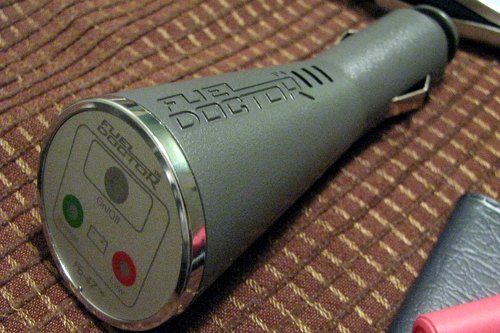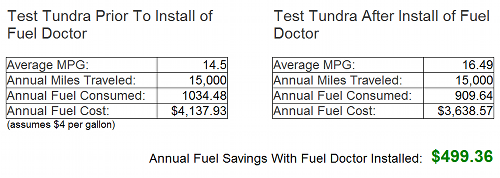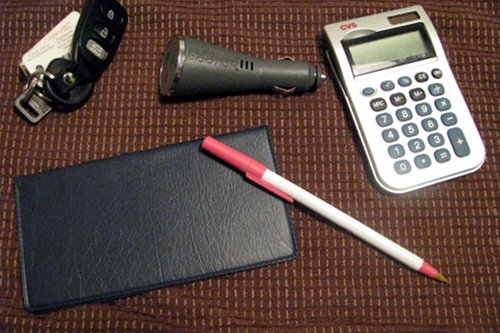Fuel Doctor Review – Does it Work?
Jason Lancaster | May 23, 2011 | Comments 10
This week we’ll be reviewing the Fuel Doctor, a fuel saving device that I encountered at the 2010 SEMA show last November.
Conducting this review will be Toby K, who runs his own Tundra Fuel Economy blog where he writes about fuel saving devices. Over each of the next five days, you’ll read a post from Toby describing his testing process. At the end, you’ll learn the following:

A close-up of the Fuel Doctor, a "electrical system conditioner" that plugs into your vehicle's cigarette lighter.
The Fuel Doctor really works – or at least it did for this specific test.
The Fuel Doctor touts something called “electronic signal conditioning,” and according to their Chief Technical Officer Doug Hungerford, the Fuel Doctor can improve fuel economy in the right circumstances. According to our admittedly small test, it does. Here’s the whole story:
How The Fuel Doctor Test Started
When I met Doug Hungerford of Fuel Doctor USA at SEMA, he told me three important things about the Fuel Doctor device:
- It doesn’t work on vehicles less than 2-3 years old. Period. If your car or truck is less than two years old, don’t buy a Fuel Doctor. Less than three years old? Probably not.
- It “conditions” electric signals to eliminate spikes in voltage. The concept is, voltage spikes interfere with various sensors and introduce a certain amount of error into the vehicle’s engine management system. Over time, this degrades performance.
- It doesn’t always improve gas mileage. Doug was up-front about the fact that sometimes, Fuel Doctor just doesn’t work. It’s not effective 100% of the time.
Naturally, when I heard these three conditions last November, I was skeptical. Hugely skeptical. I’m not an automotive engineer, but I have an engineering degree, I took a couple of electrical engineering classes, and six months ago I would have told you that this device couldn’t possibly work because vehicles already have conditioning circuits. Every car, truck, or SUV made in the last 20+ years has some sort of conditioning circuit similar to the circuit contained in the Fuel Doctor.
However, Doug was convincing. He showed me an oscilloscope test to demonstrate how much the Fuel Doctor device reduced voltage spikes, and he offered us a free testing unit. I was blunt – I told him I didn’t think it would work and that our test might not go well for them. He reiterated that it probably wouldn’t help a newer car, but that drivers of older vehicles almost always noticed an improvement.
Obviously, I took Doug up on his offer for a free test unit. I contacted Toby, and after a little back and forth, we got the test started. According to careful testing – which has lasted three months and which includes more than 5,000 miles of travel – the device improved the mileage on his 2004 Toyota Tundra by about 2 mpg. Considering the Fuel Doctor costs $50, that’s a pretty good deal. A one mile per gallon improvement on the average pickup means that you’ll go an extra 20-30 miles on a full tank. Over the course of one year – assuming 15,000 miles traveled, an average of 14.5 mpg prior to install, and a gas price of $4 per gallon – that’s $499 dollars worth of annual gas savings.

Our 2004 Tundra Test Results
Now, it must be noted that this was just one test. You could buy this device and find out it didn’t do a thing. However, considering the upside and possible fuel savings, you may want to check it out.
Here’s all the articles Toby has written about his test process:
- Introduction and Fuel Doctor Test Procedure
- Initial Impressions of Fuel Doctor Device
- Initial Test Results – 1.5 mpg improvement
- Long-term Test Results – The Fuel Doctor Worked
Fuel Doctor Test Specs

Fuel Doctor - Does It Work? Maybe. It did for us.
Test Vehicle: 2004 Toyota Tundra 4.7L V8 with approximately 194,000 miles
Test Location: Indianapolis Area, IN
Distance Traveled During Test: 5,703.6 miles
Average Fuel Economy Prior To Install: 14.5 mpg (as stated by Toby, his average for months prior)
Average Fuel Economy After Installing Fuel Doctor: 16.49 mpg
Measured Gain: 2 mpg
Standard Deviation: 0.75 mpg
Variance: 0.56 mpg
Special thanks to Toby for conducting this test – be sure to visit his Tundra Fuel Economy Blog!
Filed Under: Toyota Tundra Accessories


I’m still skeptical. Especially when you stated it may not work. I’d rather watch my driving techniques and refine them. Keep the lead foot off the accelerator. Being able to brake early and coast to a stop. Those are guaranteed ways to increase mpg and wear and tear on your vehicle.
Skepticism is good. It often keeps you from wasting money. But if you watch your driving techniques AND use a fuel doctor, it may double your savings. I use a fuel doctor in my 2001 durango. While there are always other variables at play, I have noticed a difference of about 1 mpg on average. And I don’t worry too much about driving techniques…A measly 1 mpg may not be much to write home about, but that’s an extra 20 miles on a tank of gas. At roughly 40 tanks of gas per year, that’s an extra 800 miles worth of gas each year for the one time cost of a fuel doctor.
Mickey – I’m skeptical too, but Toby has worked hard on this and takes things very seriously. If he says it worked, it worked…at least for him. 🙂
Still, your point is well taken. Good driving habits make a big difference.
Bill – Thanks for commenting.
What kind of kickbacks are you getting for shilling this worthless gadget?
I notice you state that you’re not affiliated with Toyota, but you say nothing about FD.
This blog post isn’t well disguised. Here’s a quote from the first page:
“Fuel Doctor – Does It Work? Maybe. It did for us.”
Hmm, you claim it worked on the “introduction” page? Wouldn’t you keep your conclusions to the conclusion page — unless you’re a shill?
Besides, Consumer Reports and other _serious_ testers have already given the FD a chance, and unsurprisingly, it’s worthless. What value would a single, poorly-run test documented on the Web have against that — except for MARKETING VALUE?
Actual Skeptic – I think that it’s possible to question our results without resorting to accusations of bias, don’t you?
Take the article for what it’s worth – in this one test, it added 1-2 mpg to our tester’s truck. Don’t believe it? That’s fine. But no reason to assume we’re somehow involved with Fuel Doctor.
Not that you’ll believe me, but I was 100% convinced this thing wouldn’t work. I told Doug as much prior to doing the test, and he still sent the devices to us. Go figure.
I’ll just leave this here:
http://www.compendiumarcana.com/fuel_doctor_fd47/
notAmoron – Interesting link. I’m not an electronics expert, so I’ll take your word for it.
However, our test results were well documented and we aren’t the only people who gave this thing a shot…for what it’s worth. As I’ve said previously, I never would have said this worked prior to this test.
Reply to NotaMoron and other skeptical reply!
I have used the fuel doctor device for 5 months now and keep my records i have saved in my Zefira 2003 between 1.3 and 1.5 I was like all of you at the beginning and worst of all I also tested it in Mexico city trafic !!!! no not USA the real Mexico city Mexico with the worst drivers in the universe by far worst then Russian and German drivers! and i am still amazed to say It is working !!!!! you can say what ever you want and described half way how it works or the persone on the link say it doesn’t work ??? May be the part you do not understand is the part that work!! just a tought but for me my wife and father in law it works !!! so please use caution when using words like stupid it could get back right at you !!!
I use it plug it and like it say what you want!!!
This is clearly a farse, and those who leave enthusiastic positive reviews just solidify that thought. If anything this product is a placebo with the only benefit being to make the consumer more watchful of their driving habits..sorry to burst your bubble
Duncan – You can call it whatever you want, but no one was more shocked by the result than me. Buy one, don’t buy one. I don’t care. But the numbers are valid for our particular test.